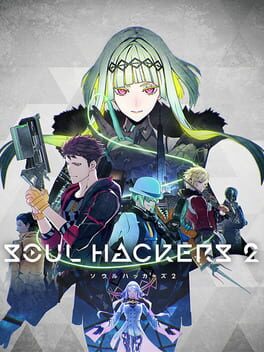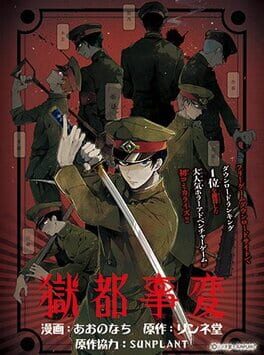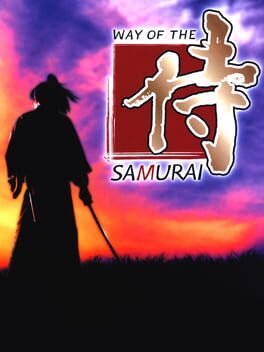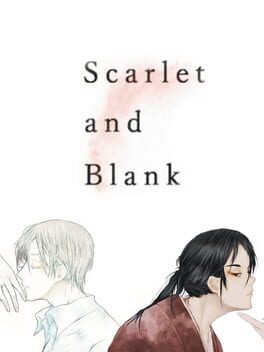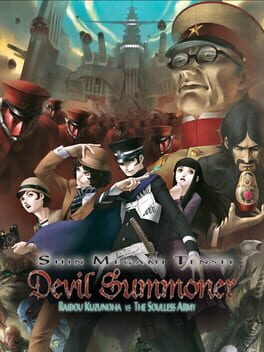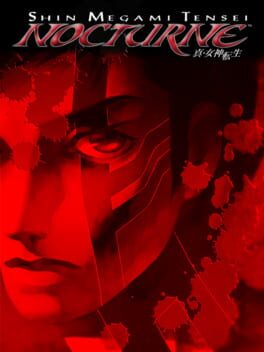Ophelia
Bio
"I hope that someday, you'll dream of me."
Making lists is my hobby, check them out!
≿━༺Lists༻━≾
𝐇𝐢𝐬𝐭𝐨𝐫𝐢𝐜𝐚𝐥 𝐉𝐚𝐩𝐚𝐧
- Heian (794 - 1185)
- Kamakura (1185 - 1333)
- Bakumatsu (1853 - 1868)
- Meiji (1868 - 1912)
- Taisho (1912 - 1926)
- Showa (1926 - 1989)
𝐀𝐬𝐢𝐚 𝐑𝐞𝐠𝐢𝐨𝐧𝐬
- West Asia
- Central Asia
- South East Asia
𝐌𝐢𝐬𝐜𝐞𝐥𝐥𝐚𝐧𝐞𝐨𝐮𝐬
- KRPGs
- HD-2D style
- Its raining again…
- Eastern Cyberpunk
- Historical Taiwan
"I hope that someday, you'll dream of me."
Making lists is my hobby, check them out!
≿━༺Lists༻━≾
𝐇𝐢𝐬𝐭𝐨𝐫𝐢𝐜𝐚𝐥 𝐉𝐚𝐩𝐚𝐧
- Heian (794 - 1185)
- Kamakura (1185 - 1333)
- Bakumatsu (1853 - 1868)
- Meiji (1868 - 1912)
- Taisho (1912 - 1926)
- Showa (1926 - 1989)
𝐀𝐬𝐢𝐚 𝐑𝐞𝐠𝐢𝐨𝐧𝐬
- West Asia
- Central Asia
- South East Asia
𝐌𝐢𝐬𝐜𝐞𝐥𝐥𝐚𝐧𝐞𝐨𝐮𝐬
- KRPGs
- HD-2D style
- Its raining again…
- Eastern Cyberpunk
- Historical Taiwan
Badges

Pinged
Mentioned by another user

Loved
Gained 100+ total review likes

GOTY '22
Participated in the 2022 Game of the Year Event

Organized
Created a list folder with 5+ lists

Well Written
Gained 10+ likes on a single review

Famous
Gained 100+ followers

3 Years of Service
Being part of the Backloggd community for 3 years

Listed
Created 10+ public lists

Shreked
Found the secret ogre page

Best Friends
Become mutual friends with at least 3 others

GOTY '21
Participated in the 2021 Game of the Year Event

Trend Setter
Gained 50+ followers

Liked
Gained 10+ total review likes

Popular
Gained 15+ followers

Noticed
Gained 3+ followers

N00b
Played 100+ games
041
Total Games Played
000
Played in 2024
129
Games Backloggd
Recently Played See More
Recently Reviewed See More
[Played on Steam with all DLC purchased]
This review will be focused on comparing Soul Hackers 2 to previous Devil Summoner games and it’s status as a sequel to Devil Summoner: Soul Hackers. I’m not advocating for this to be the only lens people view this game through, it’s just that everything else from the strengths and weaknesses of the game have already been covered in other reviews on this site.
To give some background on the series, Devil Summoner is a spinoff of Shin Megami Tensei that departs from the apocalyptic setting in place of urban settings ranging from the 1930s, present day, to the near future, where demons are kept a secret from society. The use of detective elements, the focus on the players relationship with demons, and the connected world and reoccurring organizations is what set this series apart and made it unique.
Loyalty, one of the reoccurring mechanics, is a friendship meter raised from battling with demons. Soul Hackers 1 had a very unique take on this mechanic by giving individual demons personalities and having the player take into consideration what moves they preferred to be give if they didn’t want the demon to disobey them. What made this mechanic so special was that it made the demons feel alive and put the player in the shoes of a summoner who’s training their demons, not unlike having to train a dog. This mechanic is completely absent from Soul Hackers 2.
Demon negotiations, a stable in the Megami Tensei franchise, but more importantly Soul Hackers 1 featuring one of the best iterations of this mechanic. Demons conversations were always a joy, ranging from demons commenting on the current story events, hilarious 4th wall breaks resulting in the demons having an existential crisis, to rhythm minigames. Raidou Kuzunoha vs King Abaddon also featured an amazing negotiation system where demons could pitch in to help you during them and certain demons would have conversations with each other like talking about their former master. Negotiations have been reduced to saying yes or no to a request in Soul Hackers 2.
In battles demons don’t even show up. You have 4 human characters fighting with their weapons and then performing all out attacks at the end of each turn if weaknesses were hit. The complete lack of presence of demons and being reduced to mere weapon equipables is a slap in the face compared to the previous games -including the game this is a supposed sequel to-. Instead of managing my demon team and taking into consideration their personalities I’m just shooting down demons with guns.
In the Raidou duology demon investigations were introduced where each demon has special detective skills like reading minds, freezing water, changing the appearance of raidou, and many more. When using skills the player would get to walk around as the demon and help solve puzzles for Raidou and then report back after done exploring. Soul Hackers 2 puts a “spin” on this by having Ringo send out demons at the beginning of a dungeon and then go around finding them for rewards. A few times they are used to find items like keys or a hidden door too. The problem with demon scouting is that the demons feel more like chests (and unrewarding ones at that) than partners. Talking to a NPC with the same 5 lines throughout the game to get some money or an item doesn’t really have the same effect as playing as demons and solving puzzles with them. It would of been nice of demons could follow you around like in Raidou too but even that was too much apparently.
The world doesn’t feel like one with humans and demons coexisting either. Almost all the NPCs are humans, same with the story bosses. The game is entirely focused on the summoners yet forgets about demons being a part of the world. While there are a few neat side quests like the Doppelgänger and Black Frost one, most are fetch quests that entirely ignore the existence of demons.
Devil Summoner was always a series where demons were a core part of it’s identity, to the point that it’s even in the name. While some people may bring up the fact Soul Hackers 2 dropped the name, the original Soul Hackers was no exception so it’s not really an excuse. Every game was focused around investigating the misuse of demons yet this game focuses on summoning an Eldritch monster through colorful worms and organization conflicts. This game could be rebranded where demons are entirely removed from it and not much would change while that would be impossible to do for the previous games.
As far as being a sequel to Soul Hackers goes, it isn’t one. The story takes place over 50 years in the future with none of the main cast returning. Thematically the themes explored are different, gameplay wise literally nothing carried over, and even the style of cyberpunk is very different. Ringo can “Soul Hack” all she wants but Soul Hackers was a name alluding to the concept of the game, it was never once name dropped in the original game. “Vision Quests” are also a completely different thing where they just slapped on the name as a reference. In the original it was playing through the shoes of deceased characters, in this game it’s walking through dungeons to watch cutscenes of the main cast’s past at the end. I don’t see how this is a sequel in any way and why they decided to market it as one.
One point of praise I have is that they stuck with the continuity. Devil Summoner games have reoccurring characters and organizations where each game introduces more to the lore and this one is no exception. While I feel they could of done more with the Devil Summoner world in this one, I still really appreciate that they kept the continuity and it felt really nice revisiting the Devil Summoner world after not getting a new game for 14 years. A new Kuzunoha branch revealed, Yatagarasu being expanded upon which were previously introduced in the Raidou games mostly wrapped in mystery, the return of Madame Ginko and Victor along with Phantom Society and zomas being brought back, the game delivered on this front.
World building wise unfortunately this game isn’t very good :(. Most of the NPCs just give you tips like how buffs are important or that new food is on the menu. It’s very robotic and results in not much being told about the world outside of what the main cast says during hangout events. The previous Devil Summoners had fantastic world building that aided the themes each game focuses on (dangers of the internet, effects of modernization, etc.) on top of fun npc dialogue like being able to check on one of the villains in the world map after they quit being a Dark Summoner in Soul Hackers. It really sucks how bad the NPC dialogue is in this game.
As far as being a Devil Summoner (or Soul Hackers) game goes, it does not really fit in with the series and discarded most of what made it unique. A jarring sequel to a game released 25 years ago, it’s surprising they even went with the name. While the continuity is appreciated, this game feels more like a game that takes place in the Devil Summoner world rather than being a Devil Summoner game itself. While I’m happy Atlus revived one of my favorite series, I can’t help but be disappointed in the way they went about ripping apart a core aspect of it’s identity. While it’s a good but VERY flawed game, it is a bad Devil Summoner/Soul Hackers game.
This review will be focused on comparing Soul Hackers 2 to previous Devil Summoner games and it’s status as a sequel to Devil Summoner: Soul Hackers. I’m not advocating for this to be the only lens people view this game through, it’s just that everything else from the strengths and weaknesses of the game have already been covered in other reviews on this site.
To give some background on the series, Devil Summoner is a spinoff of Shin Megami Tensei that departs from the apocalyptic setting in place of urban settings ranging from the 1930s, present day, to the near future, where demons are kept a secret from society. The use of detective elements, the focus on the players relationship with demons, and the connected world and reoccurring organizations is what set this series apart and made it unique.
Loyalty, one of the reoccurring mechanics, is a friendship meter raised from battling with demons. Soul Hackers 1 had a very unique take on this mechanic by giving individual demons personalities and having the player take into consideration what moves they preferred to be give if they didn’t want the demon to disobey them. What made this mechanic so special was that it made the demons feel alive and put the player in the shoes of a summoner who’s training their demons, not unlike having to train a dog. This mechanic is completely absent from Soul Hackers 2.
Demon negotiations, a stable in the Megami Tensei franchise, but more importantly Soul Hackers 1 featuring one of the best iterations of this mechanic. Demons conversations were always a joy, ranging from demons commenting on the current story events, hilarious 4th wall breaks resulting in the demons having an existential crisis, to rhythm minigames. Raidou Kuzunoha vs King Abaddon also featured an amazing negotiation system where demons could pitch in to help you during them and certain demons would have conversations with each other like talking about their former master. Negotiations have been reduced to saying yes or no to a request in Soul Hackers 2.
In battles demons don’t even show up. You have 4 human characters fighting with their weapons and then performing all out attacks at the end of each turn if weaknesses were hit. The complete lack of presence of demons and being reduced to mere weapon equipables is a slap in the face compared to the previous games -including the game this is a supposed sequel to-. Instead of managing my demon team and taking into consideration their personalities I’m just shooting down demons with guns.
In the Raidou duology demon investigations were introduced where each demon has special detective skills like reading minds, freezing water, changing the appearance of raidou, and many more. When using skills the player would get to walk around as the demon and help solve puzzles for Raidou and then report back after done exploring. Soul Hackers 2 puts a “spin” on this by having Ringo send out demons at the beginning of a dungeon and then go around finding them for rewards. A few times they are used to find items like keys or a hidden door too. The problem with demon scouting is that the demons feel more like chests (and unrewarding ones at that) than partners. Talking to a NPC with the same 5 lines throughout the game to get some money or an item doesn’t really have the same effect as playing as demons and solving puzzles with them. It would of been nice of demons could follow you around like in Raidou too but even that was too much apparently.
The world doesn’t feel like one with humans and demons coexisting either. Almost all the NPCs are humans, same with the story bosses. The game is entirely focused on the summoners yet forgets about demons being a part of the world. While there are a few neat side quests like the Doppelgänger and Black Frost one, most are fetch quests that entirely ignore the existence of demons.
Devil Summoner was always a series where demons were a core part of it’s identity, to the point that it’s even in the name. While some people may bring up the fact Soul Hackers 2 dropped the name, the original Soul Hackers was no exception so it’s not really an excuse. Every game was focused around investigating the misuse of demons yet this game focuses on summoning an Eldritch monster through colorful worms and organization conflicts. This game could be rebranded where demons are entirely removed from it and not much would change while that would be impossible to do for the previous games.
As far as being a sequel to Soul Hackers goes, it isn’t one. The story takes place over 50 years in the future with none of the main cast returning. Thematically the themes explored are different, gameplay wise literally nothing carried over, and even the style of cyberpunk is very different. Ringo can “Soul Hack” all she wants but Soul Hackers was a name alluding to the concept of the game, it was never once name dropped in the original game. “Vision Quests” are also a completely different thing where they just slapped on the name as a reference. In the original it was playing through the shoes of deceased characters, in this game it’s walking through dungeons to watch cutscenes of the main cast’s past at the end. I don’t see how this is a sequel in any way and why they decided to market it as one.
One point of praise I have is that they stuck with the continuity. Devil Summoner games have reoccurring characters and organizations where each game introduces more to the lore and this one is no exception. While I feel they could of done more with the Devil Summoner world in this one, I still really appreciate that they kept the continuity and it felt really nice revisiting the Devil Summoner world after not getting a new game for 14 years. A new Kuzunoha branch revealed, Yatagarasu being expanded upon which were previously introduced in the Raidou games mostly wrapped in mystery, the return of Madame Ginko and Victor along with Phantom Society and zomas being brought back, the game delivered on this front.
World building wise unfortunately this game isn’t very good :(. Most of the NPCs just give you tips like how buffs are important or that new food is on the menu. It’s very robotic and results in not much being told about the world outside of what the main cast says during hangout events. The previous Devil Summoners had fantastic world building that aided the themes each game focuses on (dangers of the internet, effects of modernization, etc.) on top of fun npc dialogue like being able to check on one of the villains in the world map after they quit being a Dark Summoner in Soul Hackers. It really sucks how bad the NPC dialogue is in this game.
As far as being a Devil Summoner (or Soul Hackers) game goes, it does not really fit in with the series and discarded most of what made it unique. A jarring sequel to a game released 25 years ago, it’s surprising they even went with the name. While the continuity is appreciated, this game feels more like a game that takes place in the Devil Summoner world rather than being a Devil Summoner game itself. While I’m happy Atlus revived one of my favorite series, I can’t help but be disappointed in the way they went about ripping apart a core aspect of it’s identity. While it’s a good but VERY flawed game, it is a bad Devil Summoner/Soul Hackers game.
[Emulated on PCSX2]
Devil Summoner: Raidou Kuzunoha vs. The Soulless Army is quite a fascinating game with a lot to digest. First, I’d like to focus on its setting which is the Taisho era of Japan (which ended in our world in 1926 but has been extended to 1931 in this game).
To give some background, in 1853 Japan was forced to end its 200 year isolation and open up trade to the west. This caused a massive change in Japan with rapid advancement in industrialization with the new Western technology, reorganization of government from feudalism to a more centralized government, and a focus on growing the military to become a world power.
So why is all this important to Raidou? By the Taisho era, the effects of westernization could still be felt strongly and is one of the central focuses of the game. From the invading demons that represent Japan’s old world, the clever use of prerendered backgrounds mixing Western and outdated Edo period architecture, beautifully crafted soundtrack incorporating Jazz which was spreading throughout the world at the time, Atlus does an incredible job at capturing this era.
Every character is feeling the effects of modernization from Denpachi who's rickshaw business has come to a standstill due to the introduction of automobiles, Tae embracing the new freedoms of women in this era, and Munakata who desires imperialism using new technology. Other themes can also be seen in the story such as recognizing and cherishing our bonds with others along with passion to do our best in life despite dark times.
The story itself takes a lot of inspiration from detective dramas, with each part of the story fitting into an episode. The light hearted and witty approach to the story telling is very pleasant and the game does not hold back with how ridiculous the story gets. Every episode has something crazy from fighting yakuza in a bathhouse while being naked with nothing but your hat on to time travel and Russian cyborgs. Episodes are also very well paced, never dwelling too long on a plot point to avoid the player getting bored.
Gameplay wise Raidou does something unprecedented for a Megami Tensei title, swapping the standard turn-based combat system with action rpg gameplay. While theres definitely a lot that can be criticized such as the poor implementation of MAG that feels more of a leftover from previous games rather than serving any purpose, loyalty requiring grinding to fuse demons, random encounters in towns, to the clunky movement and lack of melee abilities outside of basic attacks, I still enjoyed the combat a lot and appreciate what it sets out to do.
Rather than feeling like a hack and slash, Raidou finds a way to bridge the gap between action and turn-based by having a focus on managing menus from switching demons, choosing their attacks, circulating through elemental bullets, to picking items to use. I found this approach to be quite unique and appreciated the experience it brought compared to other games in the genre.
Another aspect I loved was how Atlus incorporated the adventure genre into this game to fit the theme of being a detective game. Every demon has certain skills to help Raidou on his cases such as mind reading, fitting into small areas to reach something, using lightning to sense for clues, freezing water to walk on, and many more. Rather than this just being a skill you active from a menu you actually get to control the demons and move around as them which is really really cool.
While not a perfect game, the charming characters and story along with the unique gameplay made me fall in love with this game and I highly recommend it to anyone interested in this title, regardless if you’re a Megami Tensei fan or not.
Devil Summoner: Raidou Kuzunoha vs. The Soulless Army is quite a fascinating game with a lot to digest. First, I’d like to focus on its setting which is the Taisho era of Japan (which ended in our world in 1926 but has been extended to 1931 in this game).
To give some background, in 1853 Japan was forced to end its 200 year isolation and open up trade to the west. This caused a massive change in Japan with rapid advancement in industrialization with the new Western technology, reorganization of government from feudalism to a more centralized government, and a focus on growing the military to become a world power.
So why is all this important to Raidou? By the Taisho era, the effects of westernization could still be felt strongly and is one of the central focuses of the game. From the invading demons that represent Japan’s old world, the clever use of prerendered backgrounds mixing Western and outdated Edo period architecture, beautifully crafted soundtrack incorporating Jazz which was spreading throughout the world at the time, Atlus does an incredible job at capturing this era.
Every character is feeling the effects of modernization from Denpachi who's rickshaw business has come to a standstill due to the introduction of automobiles, Tae embracing the new freedoms of women in this era, and Munakata who desires imperialism using new technology. Other themes can also be seen in the story such as recognizing and cherishing our bonds with others along with passion to do our best in life despite dark times.
The story itself takes a lot of inspiration from detective dramas, with each part of the story fitting into an episode. The light hearted and witty approach to the story telling is very pleasant and the game does not hold back with how ridiculous the story gets. Every episode has something crazy from fighting yakuza in a bathhouse while being naked with nothing but your hat on to time travel and Russian cyborgs. Episodes are also very well paced, never dwelling too long on a plot point to avoid the player getting bored.
Gameplay wise Raidou does something unprecedented for a Megami Tensei title, swapping the standard turn-based combat system with action rpg gameplay. While theres definitely a lot that can be criticized such as the poor implementation of MAG that feels more of a leftover from previous games rather than serving any purpose, loyalty requiring grinding to fuse demons, random encounters in towns, to the clunky movement and lack of melee abilities outside of basic attacks, I still enjoyed the combat a lot and appreciate what it sets out to do.
Rather than feeling like a hack and slash, Raidou finds a way to bridge the gap between action and turn-based by having a focus on managing menus from switching demons, choosing their attacks, circulating through elemental bullets, to picking items to use. I found this approach to be quite unique and appreciated the experience it brought compared to other games in the genre.
Another aspect I loved was how Atlus incorporated the adventure genre into this game to fit the theme of being a detective game. Every demon has certain skills to help Raidou on his cases such as mind reading, fitting into small areas to reach something, using lightning to sense for clues, freezing water to walk on, and many more. Rather than this just being a skill you active from a menu you actually get to control the demons and move around as them which is really really cool.
While not a perfect game, the charming characters and story along with the unique gameplay made me fall in love with this game and I highly recommend it to anyone interested in this title, regardless if you’re a Megami Tensei fan or not.
[Emulated PS2 version on PCSX2 and achieved Freedom ending]
You either get it or you don’t I guess, this game definitely wasn’t for me. I suppose some people find the dreamy surreal atmosphere formed from the minimal cel shading and Kaneko’s paintings coming to life in 3D for the first time synergizing with Meguro’s score to be something special which I can agree that the game does have its own vibe and is what I’d attribute to its biggest strength.
The first dungeon was my personal favorite part of the game, I really loved the eerie hospital and how the game did a great job at reinforcing to the player that they have turned into a demon through using NPC dialogue to make the ghosts afraid of them while demon NPCs treat the protagonist as one of their kind. Having the world flipped upside down created a nice sense of mystery and confusion which made this part of the game the most memorable for me.
As for the story, really not a fan. The story is so minimal and when the game spends so little time on developing its themes, narrative, and characters it leads me to believe its not the focus of Nocturne at all and definitely not its strength. Maybe Nocturne’s narrative is just something only certain people can appreciate but… yeah this really wasn’t it for me..
Gameplay was alright but some dungeons rely too much on trial and error through the teleportation gimmick like the red temple which throws you in poison mist if you enter the wrong door and that gets old. Not being able to relearn skills is also a bit frustrating and I don’t like how skewed the game is towards a physical build despite giving Demifiend so many magic skills. Hard mode is also completely unbalanced, don’t even bother with it.
Encounter rate gets old when not only dungeons but towns and the world map also have them. If this was a short game it probably wouldn’t bother me but 60+ hours in and it was getting irritating having to deal with them so frequently. One-hit kill skills are a cheap mechanic and its frustrating to lose progress over getting killed by a random encounter. Even if these can be prevented with magatamas I still don’t think its inclusion brings anything to the game other than annoyance which is something I can say about a lot of the game design in Nocturne.
Overall it was certainly a game, just not one for me. A good recommendation for those curious what Shin Megami Tensei is all about or want a gameplay driven turn-based rpg but those looking for characters and story should look elsewhere.
You either get it or you don’t I guess, this game definitely wasn’t for me. I suppose some people find the dreamy surreal atmosphere formed from the minimal cel shading and Kaneko’s paintings coming to life in 3D for the first time synergizing with Meguro’s score to be something special which I can agree that the game does have its own vibe and is what I’d attribute to its biggest strength.
The first dungeon was my personal favorite part of the game, I really loved the eerie hospital and how the game did a great job at reinforcing to the player that they have turned into a demon through using NPC dialogue to make the ghosts afraid of them while demon NPCs treat the protagonist as one of their kind. Having the world flipped upside down created a nice sense of mystery and confusion which made this part of the game the most memorable for me.
As for the story, really not a fan. The story is so minimal and when the game spends so little time on developing its themes, narrative, and characters it leads me to believe its not the focus of Nocturne at all and definitely not its strength. Maybe Nocturne’s narrative is just something only certain people can appreciate but… yeah this really wasn’t it for me..
Gameplay was alright but some dungeons rely too much on trial and error through the teleportation gimmick like the red temple which throws you in poison mist if you enter the wrong door and that gets old. Not being able to relearn skills is also a bit frustrating and I don’t like how skewed the game is towards a physical build despite giving Demifiend so many magic skills. Hard mode is also completely unbalanced, don’t even bother with it.
Encounter rate gets old when not only dungeons but towns and the world map also have them. If this was a short game it probably wouldn’t bother me but 60+ hours in and it was getting irritating having to deal with them so frequently. One-hit kill skills are a cheap mechanic and its frustrating to lose progress over getting killed by a random encounter. Even if these can be prevented with magatamas I still don’t think its inclusion brings anything to the game other than annoyance which is something I can say about a lot of the game design in Nocturne.
Overall it was certainly a game, just not one for me. A good recommendation for those curious what Shin Megami Tensei is all about or want a gameplay driven turn-based rpg but those looking for characters and story should look elsewhere.
